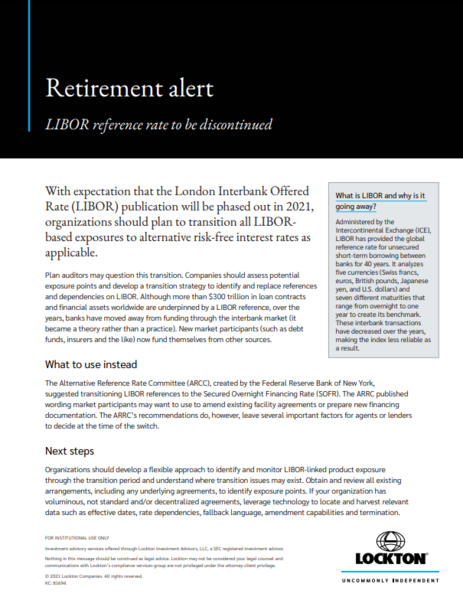With expectation that the London Interbank Offered Rate (LIBOR) publication will be phased out in 2021, organizations should plan to transition all LIBORbased exposures to alternative risk-free interest rates as applicable.
What is LIBOR and why is it going away?
Administered by the Intercontinental Exchange (ICE), LIBOR has provided the global
reference rate for unsecured short-term borrowing between banks for 40 years. It analyzes
five currencies (Swiss francs, euros, British pounds, Japanese yen, and U.S. dollars) and seven different maturities that range from overnight to one year to create its benchmark. These interbank transactions have decreased over the years, making the index less reliable as
a result.
Plan auditors may question this transition. Companies should assess potential exposure points and develop a transition strategy to identify and replace references and dependencies on LIBOR. Although more than $300 trillion in loan contracts and financial assets worldwide are underpinned by a LIBOR reference, over the years, banks have moved away from funding through the interbank market (it became a theory rather than a practice). New market participants (such as debt funds, insurers and the like) now fund themselves from other sources.
What to use instead
The Alternative Reference Rate Committee (ARRC), created by the Federal Reserve Bank of New York, suggested transitioning LIBOR references to the Secured Overnight Financing Rate (SOFR). The ARRC published wording market participants may want to use to amend existing facility agreements or prepare new financing documentation. The ARRC’s recommendations do, however, leave several important factors for agents or lenders to decide at the time of the switch.
Next steps
Organizations should develop a flexible approach to identify and monitor LIBOR-linked product exposure through the transition period and understand where transition issues may exist. Obtain and review all existing arrangements, including any underlying agreements, to identify exposure points. If your organization has voluminous, not standard and/or decentralized agreements, leverage technology to locate and harvest relevant data such as effective dates, rate dependencies, fallback language, amendment capabilities and termination.
 Download alert (opens a new window)
Download alert (opens a new window)
Investment advisory services offered through Lockton Investment Advisors, LLC, a SEC registered investment advisor.
Nothing in this message should be construed as legal advice. Lockton may not be considered your legal counsel and communications with Lockton’s compliance services group are not privileged under the attorney-client privilege.

